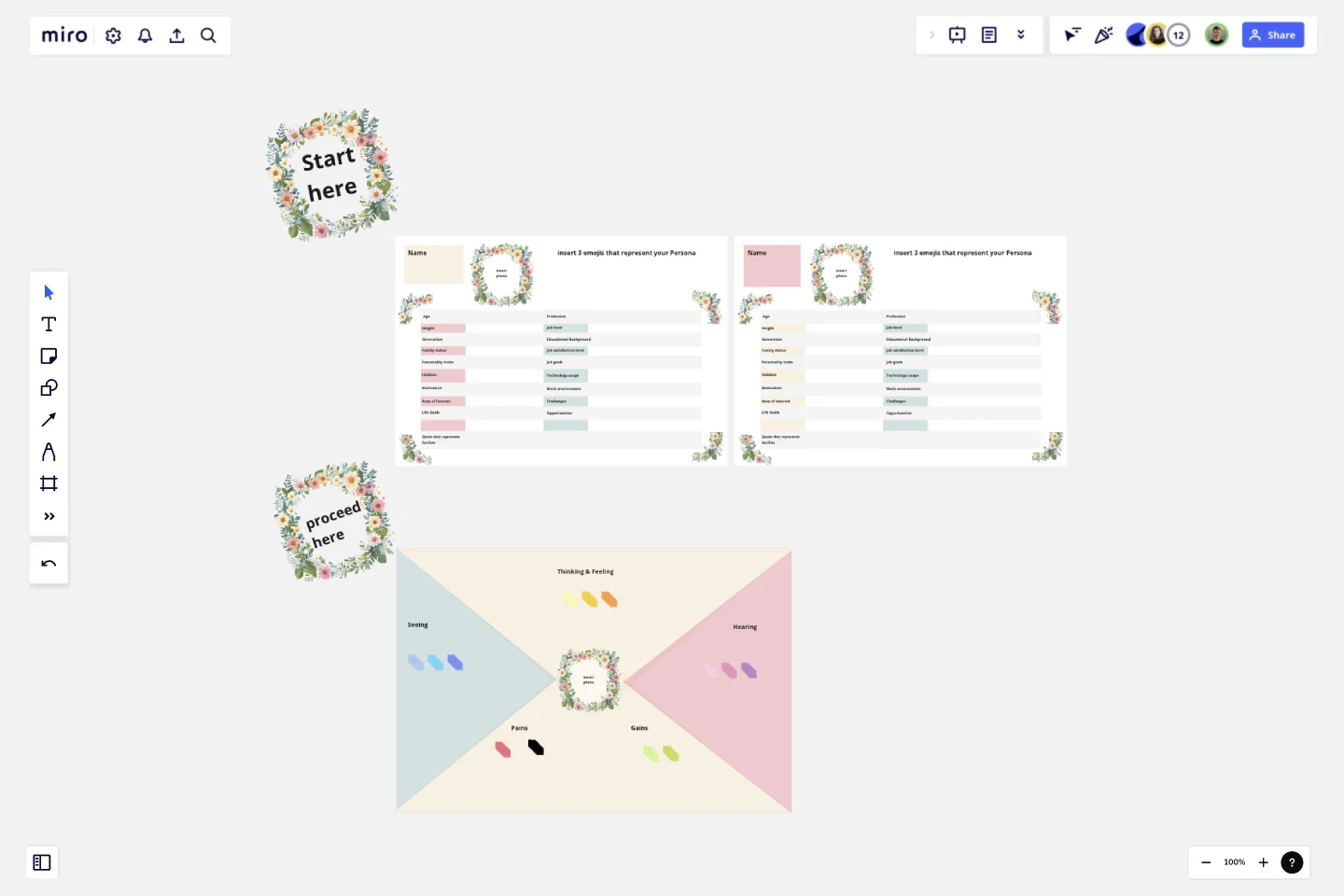Persona Empathy Map & Canvas
Check out my Persona template as well as the Persona Empathy Map inspired by the classic Canvas theme, with a little flowerly touch from "Bridgerton".
Crafting a persona is like drawing a detailed map of your ideal customer’s world. It’s about understanding who they are, what they need, and why they might love your product or getting to the core of its problem. A persona brings data to life, transforming numbers and trends into a relatable character that represents your audience.
Now, imagine pairing this persona with an empathy map. It’s like giving your team a pair of glasses to see the world through your customer’s eyes 👓. The empathy map delves into what the persona hears, sees, thinks, and feels This powerful combo ensures every decision you make is not just data-driven, but also heart-driven, aligning perfectly with the human experience at the core of your brand.
Together, they’re a dynamic duo that guides your team to create products, services, and messages that resonate deeply, fostering a genuine connection that goes beyond the surface. It’s not just useful; it’s a game-changer for customer-centric innovation!
Get started with this template right now.
Define A Winning Product Vision
Works best for:
Product Management, Planning
The Define A Winning Product Vision template assists product teams in articulating compelling visions for product development. By defining goals, target markets, and differentiation strategies, this template aligns teams around a shared vision for success. With sections for outlining product features, benefits, and value propositions, it communicates the essence of the product effectively. This template serves as a guiding light for product development efforts, inspiring creativity and focus as teams work towards bringing the product vision to life.
Product Development Phases
The Product Development Phases template assists product teams in managing and tracking product development stages effectively. By defining key phases such as ideation, design, development, and launch, this template provides a structured framework for project planning and execution. With sections for setting milestones, allocating resources, and tracking progress, it enables teams to streamline development processes and drive projects to successful completion. This template serves as a roadmap for navigating the complexities of product development and ensuring timely delivery of high-quality products.
The Hot Air Balloon Retrospective
The Hot Air Balloon is a simple activity for helping the team identify things that makes them move faster, and things that slow them down.
Product Hypothesis Canvas
Works best for:
Product Management, Planning
The Product Hypothesis Canvas template assists product teams in formulating and testing hypotheses effectively. By defining assumptions, success metrics, and validation experiments, this template guides teams through the hypothesis validation process. With sections for articulating problem statements, proposed solutions, and expected outcomes, it ensures that hypotheses are clear, testable, and aligned with strategic objectives. This template serves as a framework for hypothesis-driven product development, enabling teams to validate ideas and make data-informed decisions.
Product Development Roadmap Template
Works best for:
Product Management, Software Development
Product development roadmaps cover everything your team needs to achieve when delivering a product from concept to market launch. Your product development roadmap is also a team alignment tool that offers guidance and leadership to help your team focus on balancing product innovation and meeting your customer’s needs. Investing time in creating a roadmap focused on your product development phases helps your team communicate a vision to business leaders, designers, developers, project managers, marketers, and anyone else who influences meeting team goals.
Easter Egg Retrospective
Works best for:
Agile Methodology, Retrospectives, Meetings
The Easter Egg Retrospective template offers a themed approach to retrospectives, incorporating elements of the Easter holiday. It provides elements for reflecting on past iterations, hunting for hidden insights, and brainstorming improvements. This template enables teams to have fun while addressing serious topics, fostering creativity and collaboration. By promoting a playful yet productive atmosphere, the Easter Egg Retrospective empowers teams to uncover hidden gems, drive improvement, and strengthen team cohesion effectively.
